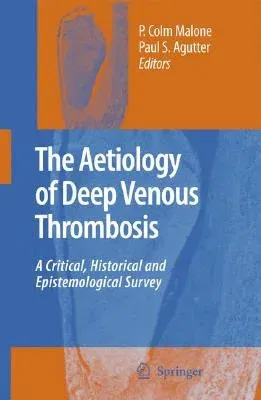P Colm Malone
(Author)The Aetiology of Deep Venous Thrombosis: A Critical, Historical and Epistemological Survey (2008)Hardcover - 2008, 24 January 2008

Qty
1
Turbo
Ships in 2 - 3 days
In Stock
Free Delivery
Cash on Delivery
15 Days
Free Returns
Secure Checkout

Print Length
318 pages
Language
English
Publisher
Springer
Date Published
24 Jan 2008
ISBN-10
140206649X
ISBN-13
9781402066498
Description
Product Details
Authors:
Book Edition:
2008
Book Format:
Hardcover
Country of Origin:
NL
Date Published:
24 January 2008
Dimensions:
23.57 x
16.1 x
1.96 cm
ISBN-10:
140206649X
ISBN-13:
9781402066498
Language:
English
Location:
Dordrecht
Pages:
318
Publisher:
Weight:
703.07 gm